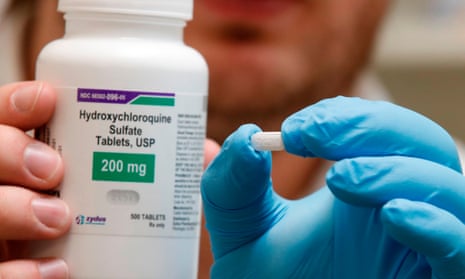An Australian trial of two experimental drugs to treat Covid-19 is under review after the World Health Organization halted all its trials involving hydroxychloroquine due to concerns about its efficacy and safety.
The board responsible for monitoring the safety of the trial was meeting on Tuesday evening to discuss the future of the study.
On Friday the Lancet published a study that found Covid-19 patients who received hydroxychloroquine were dying at higher rates and experiencing more heart-related complications than other virus patients. The large observational study analysed data from nearly 15,000 patients with Covid-19 who received the drug alone or in combination with antibiotics, comparing this data with 81,000 controls who did not receive the drug.
The drug’s efficacy and safety profile is known in preventing and treating malaria, and in treating some autoimmune conditions, but following the global pandemic researchers have hoped it would prove useful in tackling Covid-19.
However, the findings from the Lancet and other studies, including one which found higher mortality rates in severely ill hospital patients given hydroxychloroquine, prompted the World Health Organization director general Tedros Adhanom Ghebreyesus to halt the hydroxychloroquine arm of the international “Solidarity Trial”. The trial aims to find out if existing medications can manage the virus. He said the trial would be paused while the latest safety data for hydroxychloroquine was reviewed.
The Australasian Covid-19 trial (Ascot) has been recruiting patients in more than 70 hospitals in every state and territory, and 11 hospitals in New Zealand. The randomised control trial is exploring whether hydroxychloroquine in combination or on its own can treat Covid-19 patients and prevent deterioration in their condition.
A spokeswoman for the Ascot trial told Guardian Australia on Tuesday the governance committee would meet on Tuesday evening to discuss the implications of the Lancet study and other data, and of the World Health Organization statement, on the future of the trial.
“The governance committees of Ascot are continually reviewing all available evidence regarding treatment for Covid-19,” she said. “They are currently reviewing this new evidence and implications for Ascot.”
A press release promoting the Ascot trial, published in April, described how “laboratory tests have shown that lopinavir/ritonavir, which is currently used to treat HIV, and hydroxychloroquine, used to treat arthritis and prevent and treat malaria, can stop Sars-CoV-2, the virus that causes Covid-19, in its tracks”.
Philanthropy has played a significant role in funding Ascot with donations from the Royal Brisbane and Women’s Hospital Foundation, and from the Pratt Foundation and Andrew Forrest’s Minderoo Foundation.
Meanwhile, the Therapeutic Goods Administration granted former federal politician Clive Palmer a contract to import 1m doses of the drug to add to the national medical stockpile.
Despite the Australian Health Protection Principal Committee recommending against it, the health department’s advice until now has been to allow the drug to be given to patients outside clinical trials, as long as they are severely ill in hospital and the drug is administered by a specialist doctor.
On Tuesday a health department spokesman told Guardian Australia this advice would now change.
“The department will be updating its advice that hydroxychloroquine use in treating Covid-19 is strongly discouraged including in hospitalised patients unless the patient is enrolled in a clinical trial, noting that currently numbers hospitalised in Australia are very low, at this stage only 30, and there are fewer than 500 active cases across Australia,” he said.
The investigators from the Lancet study warned drug regimens for Covid-19 that involve hydroxychloroquine should not be used outside clinical trials and said urgent confirmation from randomised clinical trials was needed. However, the Lancet study has been criticised for lacking rigour in its research methods and interpretation of findings, and there is general concern that strong scientific methods are being made a casualty in the rush to find treatments for the virus.
Professor Marc Pellegrini, the lead investigator of Australia’s Covid Shield clinical trial to determine whether hydroxychloroquine can prevent the virus, said careful consideration had been given to the evidence.
“We have taken the advice of the authors of that paper who emphasise their study must be cautiously interpreted and must not be generalised with regard to the treatment (or prophylaxis) of people who are not unwell,” he said. “The trial is continuing and participants are being kept well informed.”
